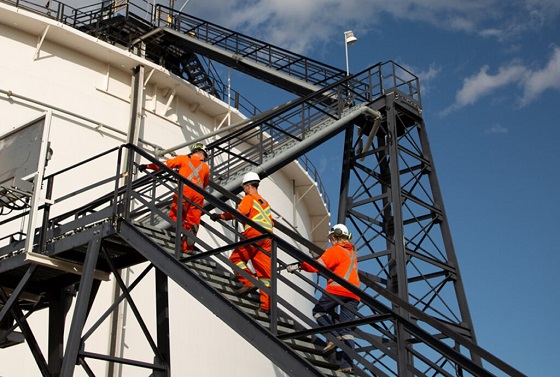Business
BUILD CANADA NOW: An Open Letter to the Prime Minister of Canada from Energy Leaders

From EnergyNow.Ca
We can strengthen economic sovereignty and resilience: Unlock private-sector investment, responsibly develop our world-class natural resources, support climate action
The Rt. Hon. Mark Carney, PC, MP
Prime Minister of Canada
Dear Prime Minister Carney,
On behalf of Canada’s leading energy companies, please accept our congratulations on your election victory and appointment as Canada’s new Prime Minister.
This moment marks not only the first chapter for your government, but also a vital opportunity for our nation to come together around shared goals and build the trust necessary to get big things done. Together we can Build Canada Now and strengthen economic sovereignty and resilience, by unlocking private sector investment, through responsibly developing Canada’s world class natural resources and supporting climate action to reduce emissions. As business leaders in Canada, we look forward to working constructively with you and your cabinet to achieve our energy sector’s potential and our shared goal to position our country as a global energy superpower.
For context, global prosperity will continue to rely on oil and natural gas for decades to come. Regardless of whether absolute global demand will grow or weaken over time, the natural decline of oil and natural gas production requires ongoing investment to replace that decline. Without continued investment, global supply could fall by more than half within 10 years—the question is, in what producing countries will investment occur, and the economic benefits realized? With abundant resources, a strong commitment to environmental stewardship and responsible energy production, it should be Canada, and it should be now. Canada can be a global energy leader and secure long-term economic prosperity.
We have reviewed your platform for governing Canada, particularly your ambition of building the fastest growing economy in the G7. As a major contributor to the Canadian economy, with significant untapped potential, the energy sector must play a pivotal role in your pursuit of this ambition. Growth in the Canadian oil and natural gas sector supports GDP growth, job creation, and tax revenue. Your focus on fostering energy independence and enhancing Canada’s energy infrastructure and clean technology, requires major sector investment and globally competitive energy and carbon policies. Over the last decade, the layering and complexity of energy policies has resulted in a lack of investor confidence and consequently, a barrier to investment – especially when compared to the United States, which is taking steps to simplify its permitting process.

In March, a subset of us wrote to you and the other federal leaders, outlining an urgent action plan needed to support ongoing and future investment from the energy sector in Canada. We note that many of these issues were talked about in your campaign and are of growing interest for Canadians as is evidenced by recent polling. The bullets below reflect our earlier action plan. Beneath each statement we have described opportunities to work together to deliver on our shared objectives.
- “Simplify regulation. The federal government’s Impact Assessment Act and West Coast tanker ban are impeding development and need to be overhauled and simplified. Regulatory processes need to be streamlined, and decisions need to withstand judicial challenges.”
- Current regulatory processes are complex, unpredictable, subjective, and excessively long. These processes inhibit the ability of industry to make timely investments, add unnecessary costs and create uncertainty within capital markets. Aligned with your proposal to streamline the approval process, industry is committed to working with your government to ensure Canada can grow exports of oil and natural gas to other regions.
- “Commit to firm deadlines for project approvals. The federal government needs to reduce regulatory timelines so that major projects are approved within 6 months of application.”
- Your proposal to have all federal regulatory authorities complete reviews of nationally significant projects within a two-year timeframe is a positive step, but insufficient. In our opinion, two years is still too long of a period for review and we must target a 6-month approval process to bring capital back to Canada. Additional clarity with regards to provincial jurisdiction is required. We believe that we can work together to accelerate this even further to accomplish urgent economic growth, while maintaining environmental standards and addressing Indigenous rights.
- “Grow production. The federal government’s unlegislated cap on emissions must be eliminated to allow the sector to reach its full potential.”
- We continue to believe the federal government’s cap on emissions creates uncertainty, is redundant, will limit growth and unnecessarily result in production cuts, and stifle infrastructure investments. Together, we can drive investment into emissions reductions by simplifying the regulatory regime, establishing an attractive fiscal environment, and ensuring carbon policies protect our export industries.
- “Attract investment. The federal carbon levy on large emitters is not globally cost competitive and should be repealed to allow provincial governments to set more suitable carbon regulations.”
- Recognizing the global nature of oil and natural gas, industry needs clear, competitive, and durable fiscal frameworks, including carbon policy and associated costs, sufficient to secure the required capital and incentivize investment in the sector. The current federal price and stringency trajectory results in uncompetitive costs compared to those we compete with to deliver our products to market. Additionally, the potential benefits of a federal approach, like consistency across jurisdictions and connected carbon markets, has failed to materialize. A solution is to revert back to the functioning system where provinces administer the policies and pricing to enable emissions-reduction investments, improve emissions performance, and maintain competitiveness.
- “Incent Indigenous co-investment opportunities. The federal government needs to provide Indigenous loan guarantees at scale so industry may create infrastructure ownership opportunities to increase prosperity for communities and to ensure that Indigenous communities benefit from development.”
- Your intention of doubling Indigenous Loan Guarantee Program to $10 billion to support infrastructure ownership opportunities and increase prosperity for communities is aligned with our earlier recommendation. That being said, Indigenous loan guarantee programs are only effective if Canada fosters a competitive investment environment. We look forward to working with you on this initiative to grow the prosperity of Indigenous communities and earn their support for our shared ambitions.
The time is now to take action, signaling to the global investment markets that Canada is ready to move forward with achieving our shared vision of Canada as a leading global energy superpower.
We know the decisions in the coming months will have a lasting impact on Canada’s economic sovereignty, economy and global position, and that each of us—governments, industry, and Canadians—has a role to play. We can’t do it without each other.
The energy industry looks forward to working together, with you and your government, on an urgent basis, for the benefit of this country and Canadians nationwide.
Regards,



Business
The Grocery Greed Myth

Haultain’s Substack is a reader-supported publication.
To receive new posts and support our work, please consider becoming a free or paid subscriber.
Try it out.
The Justin Trudeau and Jagmeet Singh charges of “greedflation” collapses under scrutiny.
“It’s not okay that our biggest grocery stores are making record profits while Canadians are struggling to put food on the table.” —PM Justin Trudeau, September 13, 2023.
A couple of days after the above statement, the then-prime minister and his government continued a campaign to blame rising food prices on grocery retailers.
The line Justin Trudeau delivered in September 2023, triggered a week of political theatre. It also handed his innovation minister, François-Philippe Champagne, a ready-made role: defender of the common shopper against supposed corporate greed. The grocery price problem would be fixed by Thanksgiving that year. That was two years ago. Remember the promise?
But as Ian Madsen of the Frontier Centre for Public Policy has shown, the numbers tell a different story. Canada’s major grocers have not been posting “record profits.” They have been inching forward in a highly competitive, capital-intensive sector. Madsen’s analysis of industry profit margins shows this clearly.
Take Loblaw. Its EBITDA margin (earnings before interest, taxes, depreciation, and amortization) averaged 11.2 per cent over the three years ending 2024. That is up slightly from 10 per cent pre-COVID. Empire grew from 3.9 to 7.6 per cent. Metro went from 7.6 to 9.6. These are steady trends, not windfalls. As Madsen rightly points out, margins like these often reflect consolidation, automation, and long-term investment.
Meanwhile, inflation tells its own story. From March 2020 to March 2024, Canada’s money supply rose by 36 per cent. Consumer prices climbed about 20 per cent in the same window. That disparity suggests grocers helped absorb inflationary pressure rather than drive it. The Justin Trudeau and Jagmeet Singh charges of “greedflation” collapses under scrutiny.
Yet Ottawa pressed ahead with its chosen solution: the Grocery Code of Conduct. It was crafted in the wake of pandemic disruptions and billed as a tool for fairness. In practice, it is a voluntary framework with no enforcement and no teeth. The dispute resolution process will not function until 2026. Key terms remain undefined. Suppliers are told they can expect “reasonable substantiation” for sudden changes in demand. They are not told what that means. But food inflation remains.
This ambiguity helps no one. Large suppliers will continue to settle matters privately. Small ones, facing the threat of lost shelf space, may feel forced to absorb losses quietly. As Madsen observes, the Code is unlikely to change much for those it claims to protect.
What it does serve is a narrative. It lets the government appear responsive while avoiding accountability. It shifts attention away from the structural causes of price increases: central bank expansion, regulatory overload, and federal spending. Instead of owning the crisis, the state points to a scapegoat.
This method is not new. The Trudeau government, of which Carney’s is a continuation, has always shown a tendency to favour symbolism over substance. Its approach to identity politics follows the same pattern. Policies are announced with fanfare, dissent is painted as bigotry, and inconvenient facts are set aside.
The Grocery Code fits this model. It is not a policy grounded in need or economic logic. It is a ritual. It gives the illusion of action. It casts grocers as villains. It gives the impression to the uncaring public that the government is “providing solutions,” and that “it has their backs.” It flatters the state.
Madsen’s work cuts through that illusion. It reminds us that grocery margins are modest, inflation was monetary, and the public is being sold a story.
Canadians deserve better than fables, but they keep voting for the same folks. They don’t think to think that they deserve a government that governs within its limits; a government that accept its role in the crises it helped cause, and restores the conditions for genuine economic freedom. The Grocery Code is not a step in that direction. It was always a distraction, wrapped in a moral pose.
And like most moral poses in Ottawa, it leaves the facts behind.
Haultain’s Substack is a reader-supported publication.
To receive new posts and support our work, please consider becoming a free or paid subscriber.
Try it out.
Business
Tax filing announcement shows consultation was a sham

The Canadian Taxpayers Federation is criticizing Prime Minister Mark Carney for announcing that the government is expanding automatic tax filing within hours of the government’s consultation ending.
“There’s no way government bureaucrats pulled an all-nighter reading through thousands of submissions and survey responses before sending Carney out to make an announcement on automatic tax filing the next morning,” said Franco Terrazzano, CTF Federal Director. “Asking Canadians for their opinion and then ignoring them isn’t a good look for Carney, it makes it look like the government is holding sham consultations.”
The government of Canada announced consultations on automatic tax filing so Canadians could give the government “broad input through an online questionnaire.”
The government’s consultation ended on Thursday, Oct. 9, 2025.
Hours after the consultation ended, Carney today announced the government would expand automatic tax filing.
The CRA is already one of the largest arms of the federal government with 52,499 bureaucrats.
The CRA added 13,015 employees since 2016 – a 33 per cent increase. For comparison, America’s Internal Revenue Service has 90,516 bureaucrats. The CRA has one bureaucrat for every 800 Canadians. The IRS has one bureaucrat for every 3,800 Americans.
“The CRA can barely answer the phone, so Carney shouldn’t be giving those bureaucrats more busy work to do,” Terrazzano said. “The CRA is a bloated mess, and Carney should be cutting the cost of bureaucracy not scheming up ways to give the bureaucracy more power over taxpayers.”
The CRA only answered about 36 per cent of the 53.5 million calls it received between March 2016 and March 2017, according to a 2017 Auditor General report. When Canadians were able to get the CRA on the phone, call centre agents gave inaccurate information about 30 per cent of the time.
“The CRA acting as both tax collector and tax filer is a serious conflict of interest,” Terrazzano said. “Trusting the taxman to do your tax return is like trusting your dog to protect your burger.
“Carney should stop the CRA power grab and instead cut taxes and simplify the tax code.”
-

 Alberta2 days ago
Alberta2 days agoFact, fiction, and the pipeline that’s paying Canada’s rent
-

 Business1 day ago
Business1 day agoTrump Warns Beijing Of ‘Countermeasures’ As China Tightens Grip On Critical Resources
-

 Business22 hours ago
Business22 hours agoCarney government plans to muddy the fiscal waters in upcoming budget
-

 International1 day ago
International1 day agoTrump gets an honourable mention: Nobel winner dedicates peace prize to Trump
-

 International2 days ago
International2 days agoTrump-brokered Gaza peace agreement enters first phase
-

 Alberta2 days ago
Alberta2 days agoAlberta Is Where Canadians Go When They Want To Build A Better Life
-

 Crime1 day ago
Crime1 day agoCanada’s safety minister says he has not met with any members of damaged or destroyed churches
-

 COVID-191 day ago
COVID-191 day agoTamara Lich says she has no ‘remorse,’ no reason to apologize for leading Freedom Convoy







